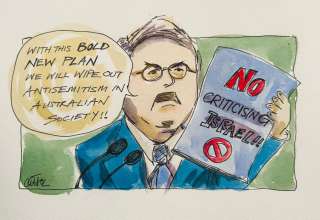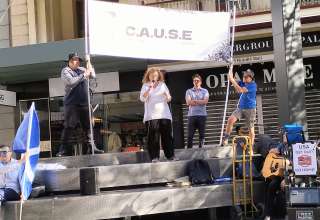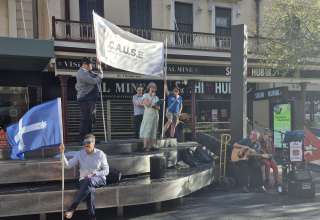by Humphrey McQueen,
March 31, 2022, Canberra
My father has been dead for fifty years. He was going on for seventy-two, and had been doing on that Friday in late October 1971 what he had done for most of his life: labouring in a tannery. As usual on Friday nights, he brought home fish-and-chips and a bottle of Fourex, to fall asleep in front of the television. My mother could not wake him.
Born illegitimate on March 31, 1899 at Anakie in the gem fields of Central Queensland, he never mentioned his mother. Had she abandoned him, or did she die in childbirth? He did not know that his given name, ‘Dennis,’ was spelt with two ‘ns,’ or that he had a middle name, ‘Eagers,’ until he needed a birth certificate to marry late in 1941. Was ‘Eagers’ a clue to his father?
He was brought up by his gran who ran a shop in Clermont. When he was eleven, she sent him 700 kilometers south to Ipswich to work in another general store. On the morning of February 2, 1912, the shopkeeper left him in charge while he, carrying a length of 4×2, rode his ‘barrel mare’ into Brisbane to sign on as a special constable, breaking heads on ‘Baton Friday’ to put an end to the General Strike.
From work in an Eagle St warehouse, he found his first job in the leather trades with a backyard operation. When it closed in August 1916, he went back to his birthplace for nine months, in time to experience the deluge late in December 1916 when sixty-seven people drowned at Clermont. I can find no trace among the victims of one who might have been his gran. He returned to Brisbane with five rubies, to have them stolen.
Back in Brisbane, he worked for one of the largest leather firms in Australia , T.C. Dixon & Sons, who had their tannery at Hill End near the river into which spilt its effluent. Their multi-storied brick boot-factory, now yet another Arts Centre, was on the other side of Montague Road.
Despite high levels of wartime unemployment, there was still a shortage of men willing and able to heave water-soaked hides out of the pits. Picture the foreman’s relief when a huge Scandinavian asked for a job. No sooner had he got into the pit than he began a go-slow. The foreman screamed abuse, threatened, but would neither get into the pit himself nor halt the job. Word spread that there would be brawl at lunch-time. The newcomer was in no greater hurry to get out than he had been to throw up the hides. By the time he did, the entire workforce had gathered. My father recalled that the stranger ambled across to the foreman, ‘king-hit’ him, before turning to the men: ‘I’m from the Industrial Workers of the World and it’s time you mugs got organised,’ and walked out the gate.
They had never seen anyone stand up to a boss like that. Within the year, most had joined the Leather Trades Union. Here indeed was ‘propaganda by deed.’ At the time, such deeds raged far beyond that clash between one agent of capital and a militant labourer. His king-hit landed in a world lit by the dawn of revolution.
By then, my father had moved to Drake street, Hill End, 300 metres from the tannery. The landlady had been a teenage prostitute in John Wren’s brothel on Highgate Hill to which clients were conveyed from North Quay by cab. She and its driver fell for each other, and decided to keep working until they could save enough for a Queenslander to run as a boarding house.
On several Saturday mornings each year, my father would visit her, sometimes taking me along. I was fascinated and frightened by her appearance as she stretched out on a settee, elephantine ears pierced by tiny gold rings, and ulcerated bare feet. A greater puzzle was the stream of men who dropped by, all calling her ‘Mother,’ as did my father. I knew that she was not my other grandmother, and could not have given birth to all her visitors. The explanation let me glimpse what class consciousness can mean in daily life. Throughout the interwar years, work was always intermittent. By the early 1930s, employers laid off single men first, her boarders. She ran socialism in one boarding house. Those in work paid their rent. The unemployed did not. No one was evicted. They got a bed and something approaching three meals a day. What else could they call her but ‘Mother’? She became the matriarch of Drake street.
A few houses away, German cabinet-makers changed their named to Murton. Someone taught their cockatoo to shriek ‘Hang the King! UP the Kaiser!’ It had to be covered with a blanket for the duration, but survived into the early 1950s for me to enjoy repeat performances.
Although the boss-class granted my father three years unpaid long-service in the early 1930s, he was able to pay rent by working as a penciller with a bookie on the Flat at the dogs. My father, the bookmaker and the bagman each went threepence in the shilling with John Wren, who owned the racetrack and the Stadium, if not the Labor government. My father saw how easy it was to ‘dope’ a greyhound with a ounce of chopped liver or a teacup of stout too much or too little: ‘A man might be silly enough to put money on a bloody horse’, he would say, ‘but he’s not so bloody stupid as to put money on a dog.’
His arithmetical skills intimidated me. How could someone who had left school before teenage keep track of dozens of threepenny bets so that the book-maker knew by the minute what odds it was safe to offer. My father was no ‘mute, inglorious’ Newton but his abilities show that workers are not as genetically stupid as alleged by Gary Marks and Pru Goward. Had he been born forty years later, he might have been an accountant, or taught STEM at TAFE.
Reading little beyond the Courier Mail and the Telegraph, and owning no books, he was not a worker intellectual, yet he was curious. He watched the Sunday afternoon telecasts of Shakespeare, getting up from Hamlet: ‘So, that’s what it’s about.’ His generation valued leaders who put into words what they felt. From a rally on North Quay, he recalled, decades later, the State Attorney-General, J.A. Fehilly, dismiss England as a land of ‘Cant, hypocrisy and humbug.’
Yet he was not stuck in the past. At the time of the 1957 split, the nearest State Labor member was Bert Turner who had held Kelvin Grove for twenty-five years. All Turner could say was to warn how terrible the Moore government had been during the opening years of the depression. My parents would have none of that. They needed no one to remind them of how dreadful life had been in the early 1930s, and after, but they were not blind to the ways Australia was being transformed. In 1961, they welcomed leaders like Clem Jones as Brisbane’s Lord Mayor, and the university lecturer Max Poulter for the Senate, (who died of cancer before being sworn in.)
Because my mother was tribal Catholic – ‘Vote Labor: Bank Commonwealth’ – my father had to attend six sessions with a priest who explained that children of mixed marriages had to be brought up Catholic. He came away relieved that Father Humphries had not tried to convert him or make him confess his sins. So he had me christened Humphrey, a given name he would have known from Bogart. He was not an atheist, but rather an a-theist. The question of an afterlife never entered his thinking. Yet he had his clutch of superstitions: ‘Never pick up a tray bit on a race course.’ ‘Don’t move house on a Friday.’ We shifted on Thursday 13th.
On marrying, my parents rented a Queenslander in Kenwyn Rd, Red Hill, so he could work at Fulchter brothers, whose tannery is now the site of the Brisbane Broncos. They took in my aunt, her two children and my mother’s mother. A flow of servicemen – some GIs – were welcome to spend a night or two on the verandah.
To protect us, he excavated an air-raid shelter in the backyard. A pumpkin vine concealed the entrance. Whenever a siren sounded, instead of joining the other workers in their trench, he sprinted across Gilbert Park to be with us.
By August 1945, they were hoping to buy a 24-perch block, some twelve kilometers from the GPO in Payne Road, The Gap, for £22.10.00. Its owner insisted on selling his adjoining allotments for £45.00, which they agreed to pay in installments. During 1949, they secured a twenty-year mortgage with the Permanent Building Society to have a five-squareweatherboard-and-fibro house built for £1,000 just before Menzies got in to abolish price controls. His best friend, Bob Hovey, got a slightly smaller place a year later for almost twice as much.
My father knew himself well enough never to contemplate building his own place, unlike our neighbours, Dave Napier and Bert Hill. (see on www.suplusvalue.org.au/mcqueen/ Instead, he set about concreting and painting, repainting, and repainting. For a few years, my bedroom featured mushroom and duck-egg blue. One summer, he decided to paint the outside in the Labor Party colours of alternating red and white stripes. He gave that political statement away after paints speckled the boards below.
He kept chooks, never gardened, apart from a few tomato plants, the regulation maximum of five banana trees, and a choko vine around the outhouse. For the first few months, he had to bury our night soil until Hunter Brothers extended their service into the Gap. We recylced the Women’s Weekly by nailing half-sheets to the dunny wall.
The newsagent delivered to barely more than 120 houses on a Sunday. There was no Council bus service. A private one ran to suit the owner-driver’s needs. More reliable were motorists who stopped for anyone walking to or from the tram. My father never owned a car or learned to drive. Before taking the train to visit us in Canberra early in 1971, he had never been further south than fishing trips to the Tweed. As we watched Sputnik pass, he shook his head: ‘I never thought a man would live to see a spaceship.’
Waterworks Road was the only sealed road in The Gap, but not curbed and channeled. By the end of each cyclonic summer, the condition of Payne Rd was such that, not only did we call it Pain Road, but the street sign at the top of its first hill warned drivers that they were henceforth on Paynes Rd. Clem fixed that, and sewered Greater Brisbane.
A two-stroke Victa served as a plough to level the yard. My father would lift it almost shoulder high to trim bushes. The tannery had to employ an engine-driver to turn the power on in the morning and off in the afternoon. To fill in his seven hours fifty minutes, he did odd jobs for the other men, keeping my father supplied with blades.
Since the ice-man did not deliver, our first durable was a Silent Knight fridge. An electric range replaced the wood stove, and later still, a hot-water service took over from a chip-heater in the bathroom. Even though my parents paid off only one appliance at a time, they were careful not to take on too much debt for each one. When a Chesterfield suite turned up priced at £15, and not £12.5.00, they had a long discussion on the front steps as to whether they could let the delivery men bring in it inside. That such considerations were normal was clear from the patience of those workers.
If frugal comfort was expanding, everyday life remained a good way short of affluence. Late in 1959, however, as I was about to start work, they could afford to pay off the first television set in the street – a Stromberg- Carlson. A year later, we stood agog watching the West Indies perform their hat-trick at the ‘Gabba.
Given my father’s upbringing, where did he acquire what today are marketed as parenting skills? Each occasion of my waywardness was met with ‘There’ll be new rules and regulations in this household.’ There never were, perhaps because he was convinced that ‘Experience is the substitute for the good advice, we never take.’ Every night before bed, he kissed me on the forehead. At the time, I took his unconditional love for granted but have since seen it as remarkable. Was it the lesson he took from being orphaned?
When I left school to start work in the Commonwealth Public Service he felt that he had set me up for life since I would never be unemployed. But he didn’t grumble when I resigned to attend university full-time from 1962. Other than the chemists at work, he had met no one who had been to a university until he got to know some from the St Lucia Branch of the Labor Party, in the same Federal electorate of Ryan.
In July 1962, an issue of the Freethinker made front-page leads in the Sunday Mail and Truth and me notorious.[1] Despite the embarrassment that scandal must have caused him at work, there was never a glint of disapproval. ‘Home,’ wrote Robert Frost, ‘is the place where, when you have to go there,/ They have to take you in.’ Home was more than that for my parents for, as Frost adds, home is: ‘Something you somehow haven’t to deserve.’
When a friend of his remarked that I had grown an inch taller than his six foot one inch, he replied: ‘I’d be even taller if someone had fed me as well as I’ve fed him.’ That he was a ‘good provider’ was taken for granted. That he put food on the table was not the half of it. Four nights a week, he cooked ‘tea’ – meat and three veg – and did the grocery shopping. He bought himself a pressure-cooker to coordinate the timing of the vege and to prepare tripe or himself.
If his cooking evening meals seems unusual for a man of the house it was no more so than that my mother had gone back to work in the late 1940s. (Her working life merits its own retelling.) She did the weekend baking and roasting. First thing on Saturday, he helped with the weekly wash, lifting the sheets out of the electric copper, putting them through the ringer, and hanging them around the Hills hoist. To do so, was being fair.
Up each morning by 5.30, he shaved, fed the chooks, got his own breakfast of Weet-bix, prepared his lunch, including a wedge of the boiled fruit cake that my mother made every Sunday, and was out the door by 6.30 am to start work before 7.30. He did not own a watch. Had he absorbed the time discipline of work?
After he had been in the Leather and Allied Trades Union for fifty years, the Queensland secretary got him to write up his experiences for its journal. (Reproduced below.) He mentions none of the political matters I report here. Instead, he writes about the friends he had made, expressing ‘the greatest respect’ for fellow labourers: ‘Bill and Jack have passed over the great divide, but Roy, like myself, is still plugging away.’ (That other long-stayer was the father of Roy Harvey, Lord Mayor in the early Eighties.)
Here is also his satisfaction, approaching pride, on the quality of the leathers he had worked up, such as the knacks in tanning kid, calf and kangaroo, even unborn calves (sleek) with their fur-like hairs in tact. While assisting the chemists, he kept pages of recipes – if not formulae.
Chemistry had another dimension. Handling hides treated with chromium sulfate ate into his hands. My mother machine-stitched calico inserts for his rubber gloves, and he smeared his hands with Zam-Buk ointment. The ulcers did not disappear until he switched to other tasks. Such injuries were accepted as a condition of work.
His stand-by cures were Goanna Salve for bruises, Friar’s Balsam for congestion, Condy’s crystals and acriflovine for cuts and abrasions. I never saw him take an Aspro, which was as close to Big Pharma as any of us came in those days. A GP who called to treat his bronchial flu turned to my mother: ‘If he doesn’t stop smoking, he won’t see the boy grow up.’ Stop he did. Twenty years later when I asked him how he had quit he replied: ‘I stopped.’
Apart from rubber gloves and galoshes, he never bought work clothes, never wore underpants, short-sleeves or short pants, always sported a hat, often as not on the back of his head. Saturday was different. Dressed up for the races, he allowed himself a set sum of spending money. If he had a good win, he’d arrive home in a cab with a couple of bottles of oysters to spice with Worcestershire sauce on buttered bread.
Men who had worked together over the decades in various tanneries dropped by the Saloon Bar of the old Criterion on Saturday forenoons for a couple of ales as one more strand in sustaining friendships as the woof and weave of being working-class. Four of them took shares each week in the Golden Casket, settling up when they next met my father, the cashier. No sooner had my parents paid off their mortgage than they won £200.
With the legal of age of entry to hotels then twenty-one, he did not take me with him until I turned eighteen. I was struck by their respect for the barmaid. They stopped swearing when she came within what they judged to be within earshot. A safe working environment was her right. My mother had been a barmaid at the Regatta when they met. Blokes entrusted barmaids with their pay packets on Friday nights, to collect when they sobered up.
They did not have to be told that they should not mistreat women, or neglect their children, which was a kind of scabbing. My father never asked the one neighbour who did not measure up to join the Labor Party. When a funeral passed, men faced the hearse, bowed their bared heads as one more common decency.
At home, my father confined swearing to the sanguinary adjective as in ‘The greatest bloody mystery of all bloody times what happened to that bloody Hammer,’ or whatever else it was the office for my mother to hand him something that was usually under his nose. If they did not bicker, that was not because she could not stick up for herself as she demonstrated at work and at Labor Party meetings. If she wanted to go to work when she was sick, he’d say, ’Stella, when we think we can’t be done without, stick your hand in a bucket of water, pull it out, and see what a bloody great hole we’ve left behind.’
My parents had been recruited to the Labor Party in the early Fifties by a Grouper. The branch fell apart after the 1954 Split, to be started up again after the split in Queensland in 1957. A branch needed seven members and its monthly meetings in the Scout Hall five for a quorum. The day I turned fifteen, they enrolled me in the Great Australian Labor Party. The three McQueens became the core of a tiny branch in one of the safest Tory seats in the country, Mt Coot-tha for the State and City Council, and Ryan for the Feds.
Before Christmas that year, he asked a Communist friend to find a copy of Frank Hardy’s Power Without Glory, which turned up as the two-volume Seven Seas edition from East Germany. He handed it to me saying: ‘You’d better to see what we’ve got you into.’
All but one of our Branch members were blue-collar workers, a plasterer, a PMG linesman, a pantry-maid, and two carpenters. Their vocabulary would now convict them of racism and sexism. Yet, in 1959, I found unanimous support in my Branch, and at the State and Federal Electorate Committees, for a motion to amend the Party’s Fighting Platform to rewrite the Aborigines Preservation and Protection Act (1897) in line with the United Nations Declaration on Human Rights. Returned servicemen backed Evatt’s support for independence movements across the Empire-Commonwealth by recounting how they had seen natives being flogged to work harder. That was more than enough to convince the others.
The 1961 Federal poll was Australia’s first television election. The ABC did its public duty by allowing the candidates screen-time. This included a scatter of Communists. Their candidate for Brisbane, W.E. Bowden, was even less comfortable in front of the cameras than Menzies. Bowden took the safe course of reading out the Party’s fighting platform – Nationalise the Banks; Nationalise the Oil companies; Nationalise BHP. After each proposal, my father interjected: ‘The bloody Labor Party should be saying that.’ Had he been in France or Italy, he, and most of his workmates and those in our ALP Branch would have voted Communist, and joined the Party. Here, Voting Labor was their only option.
But parliament was not the be-all and end-all of life as a worker. Praise in the Australian from Henry Mayer for my 1968 articles about convicts and racism made my father be sure he saw those fortnightly columns. From them, he sent off for anarchist pamphlets. Around the tannery, he pasted up ‘Fast Workers Die Young,’ an echo from the Wobbly era. The O’Shea strike, following the global earthquake in 1968, rekindled the spirit of fifty years before. Par for the course in an era of what, in effect, was still compulsory unionism, members lagged in paying their dues. Tired of chasing them up, he called a stop-work because of non-unionists on site. The officials were as flummoxed as the owners, as were the blokes, who promptly coughed up.
His most regular maxim was that ‘The worker has no friend but himself.’ Nothing was further from his mind than selfishness or egoism, but voiced his conviction that no one was going to do for us what we don’t do for ourselves. Branch members never gave a thought to personal gain. They had their hands in their pockets, scratching a few quid together to put leaflets into letter boxes, erect How-to Vote-signs and pay for cards to hand out on polling day.
The Party’s lapel badge proclaimed ‘The Unity of Labour is the Hope of the World.’ No more depressions. No more wars. Today, Canberra’s Labor Clubs sport the motto: ‘It’s all about YOU.’ My parents would have found that slogan incomprehensible. For them, it was all about all of US. Had I been able to explain the motto to them, their reaction would have been: ‘If that’s how you see the world, why aren’t you with the Liberal Party at the Golf Club?’
Marx refers to the wage-slave as ’like someone who has brought his own hide to market, and now has nothing else to expect but a tanning.’ That is not how my father would have summed up his working life. Yes, he knew that workers had no friends but themselves. But it was those friendships that made work less punishing, and, more importantly, enriched other aspects of their being.
My father’s life was not a life in politics. Rather, it lets us glimpse the impress that, in those days, everyday doings bore on class consciousness. Long before ‘verbaling’ became current as the term for being stitched up, he had taught me to ‘Never trust a copper.’
These pages say too little about the most significant source of that moral economy, his hour-by-hour cooperation with others to turn hides into boot and shoe leather, thereby building trust between them. Work gave their lives meaning through friendships, the capacity to support a family, to enjoy a few beers and a bet, and to feel that a job well done brought a wider benefit: ‘There’s no such thing as cheap shoes. They won’t last and they ruin your feet.’
Through a neighbour, we got to know orchardists at Wyberba, a siding south of Stanthorpe. My parents took the train there for their annual leave where he helped out at a different rhythm in a cooler climate. Three weeks after he retired at sixty-five, he got his job back. His body was still as strong as a horse – his nickname. Shocking as his death was for my mother, his being bed-ridden, or even house-bound, would have been intolerable for him.
The only object I have of his are nail clippers. They were never sharp but designed to cut by pressure, so that they can be used equally by either hand. They must be older than he was when he died. They still work.
[1] For the atmospherics see Merle Thornton, Bringing the Fight A firebrand feminist’s life of defiance and determination (Sydney: HarperCollins, 2020), 130-56.








